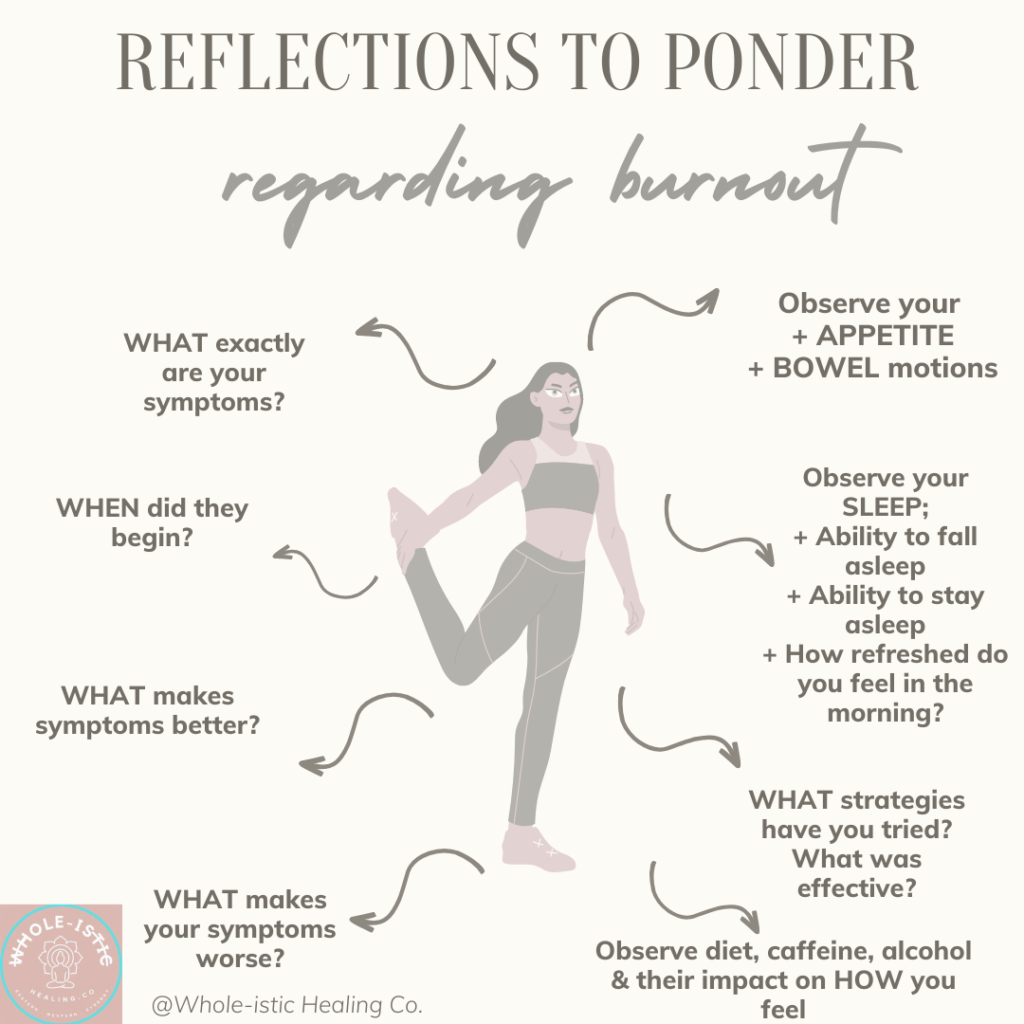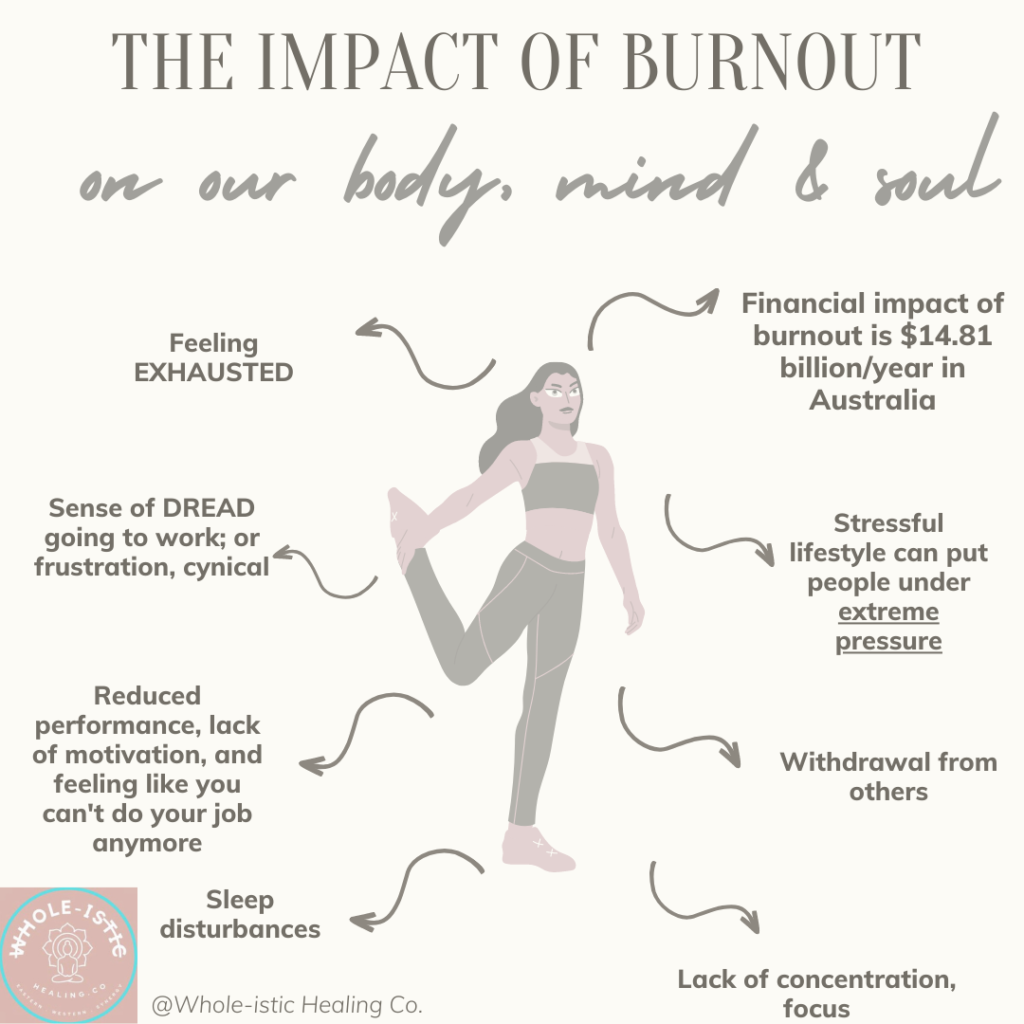burnout
We have ALL heard about the term ‘burnout’, but what exactly is it and what is the difference to depression or mood related disorders?
If we stop and think of our modern way of living;
+ looking after children
+ possibly broken sleep with children waking up throughout the night
+ getting everyone ready
+ cooking
+ cleaning
+ going to work, managing businesses/careers,
+ school life, homework, extracurricular activities,
+ nurturing your relationship, family and friends,
+ exercise, weekend sporting commitments etc. etc. etc…
This stop/start, constant movement and ‘busy-ness’, coupled with investigating nutrition and lifestyle choices, coupled with perhaps a lack of ‘tribe’ where everyone is on this ‘rat-race’, to me, intuitively, there is no wonder we as a collective experience burnout.
City living has a frenetic energy that is palpably noticeable for me, after living in quieter areas of Perth, Cairns and the Gold Coast. It almost feels like a vortex that we have become sucked into, and we have to move fast, or else it feels like people are pushing to make their way through past you.
Does any of that sound familiar?
The Black Dog Institute states that the financial impact of burnout with ‘stress-related absenteeism and presenteeism costing Australia $14.81 billion per year’
In an article, https://www.ncbi.nlm.nih.gov/books/NBK279286/, ‘’a stressful lifestyle can put people under extreme pressure, to the point that they feel exhausted, empty, burned out, and unable to cope. Stress at work can also cause physical and mental symptoms.’
Factors at play can be;
- Put under time pressures
- Conflict with colleagues
- Neglecting own needs
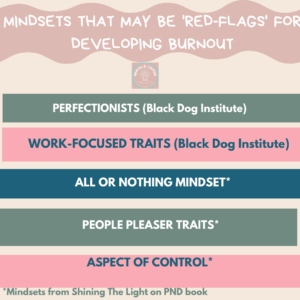
What does the WHO define BURNOUT as?
It is not classified as a medical condition, but rather an occupational phenomenon in the 11th Revision of the International Classification of Diseases (ICD-11).
‘’Burn-out is defined in ICD-11 as follows: a syndrome conceptualized as resulting from chronic workplace stress that has not been successfully managed. It is characterized by three dimensions:
- feelings of energy depletion or exhaustion;
- increased mental distance from one’s job, or feelings of negativism or cynicism related to one’s job; and
- reduced professional efficacy.
Burn-out refers specifically to phenomena in the occupational context and should not be applied to describe experiences in other areas of life.”
This then pertains to an occupational standpoint, but I then wonder where the shades of grey come in, when we speak of stay at home mothers, feeling this way about home life when we have occupations outside of the home also, or caring for an ill family member?
A study by the UNSW of 1019 people, a statement by Professor Parker was “Interestingly, our findings also show that burnout doesn’t exclusively affect those in paid employment,” “By broadening the study’s scope to include those with unpaid home or care duties, we were able to note that burnout is not limited to those exposed to work-related stressors, which suggests burnout may be ‘context free’.”
WHAT ARE THE SIGNS AND SYMPTOMS OF BURNOUT?
The 3 main areas include;
- Exhaustion: feeling drained, physically and emotionally exhausted and unable to cope.
- Alienation from (work-related) activities: can find their work stressful, frustrating and cynical. Sense of dread having to go to work.
- Reduced performance: makes it difficult to perform, lack of motivation and energy, as well as feeling you can no longer do your job.
However, in one of UNSW’s new studies, the responses from 1,019 people who completed a questionnaire indicated nine other factors commonly affecting people experiencing burnout. These included:
- Anxiety/stress
- Depression and low mood
- Irritability and anger
- Sleep disturbances
- Lack of motivation or passion
- Lack of concentration, memory loss or brain fog
- Withdrawal from others
- Physical symptoms such as aches, headaches, nausea and low libido
- Emotional fragility
-
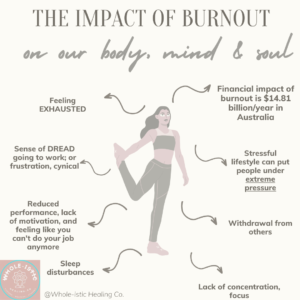
HOW DO YOU KNOW IF IT IS DEPRESSION OR BURNOUT?
The most important thing is to NEVER self-diagnose! There can be parallels between them, but treating someone who actually has depression with rest and strategies for burnout, may in fact delay their correct treatment.
Similarities between the two can include;
- Lack of motivation
- Exhaustion, low energy and fatigue
- Reduced performance and ability to focus or concentrate, as well as reduced empathy which is quite evident in health related jobs such as being a doctor or nurse
However, depression may present with greater symptoms and ones that should not be ignored; such as hopelessness and suicidal ideations, and the cause can be very different and hence the treatment!
I would therefore not ‘guess’ or assume, or self-diagnose; as this can delay correct treatment.
Therefore, it is vital to see your GP who can do a thorough investigation into how you feel, what is going on, look into your physiological markers, diet, lifestyle and investigate further.
I would recommend asking for a LONG appointment and obtaining a full analysis of what is going on.
I would also say though, to reflect, and ponder on the following so that you can discuss your findings and observations with your GP;
+ What exactly are your symptoms?
+ When did they start?
+ What makes them better or worse?
+ Observe your appetite, your sleep (ability to fall asleep and stay asleep, how refreshed you feel in the morning), bowel movements
+ Do certain practices/food/situations make the symptoms worse?
+ How is your gut health?
Now, The BLACKDOG INSTITUTE has a great article; https://www.blackdoginstitute.org.au/news/burnout-diagnosis-one-step-closer-with-new-clinical-checklist-and-predictor-of-which-personalities-are-most-at-risk/
They conducted a study and found certain mindsets or ‘personality traits’;
–perfectionists and work-focused traits were ‘red flags’ for developing burnout
In my book, ‘Shining The Light on PND’, I wrote a chapter about mindsets and I would think that the
+ ‘all or nothing’ trait; working yourself to the bone and only relaxing when you have ‘finished’ your task…but for example with children, what I am learning is that it’s never ALL done! There is always something to do, and as they get older, I am finding the demands are changing, but I feel are more time consuming? (or have I over committed?!)
+ The ‘people pleaser’ trait also would stand out for me, as well as;
+ ‘comparison’ as you may push yourself harder than your own intrinsic need and values because you are comparing to other people or standards
+ ‘control’, not relinquishing any control may make you work harder, if you feel like you can do it best

How to treat burnout?
Whilst there is no ‘remedy’ or prescription per se, I would encourage you to see your GP who can undertake the necessary tests and then refer you to whomever they feel necessary!
It could be to a psychologist, CBT, sleep studies, blood tests, adrenal function testing, thyroid function testing; whatever they deem appropriate, I believe they are the first point of call!
There could be an underlying thyroid condition, or adrenal related conditions such as Cushing’s or Addison’s disease, there could be depression. The tricky thing is if blood results don’t fit within the boundaries that are accepted in the medical world, there are shades of grey where you don’t feel your best self but cannot be ‘diagnosed’ as such.
Integrative GP’s can look into cortisol levels, heavy metals, and further neurotransmitter tests that may be of interest to you. Costly yes, I would 100% attest to that, but if you are intrigued as to what exactly is happening at a deeper level then look for an Integrative GP around you.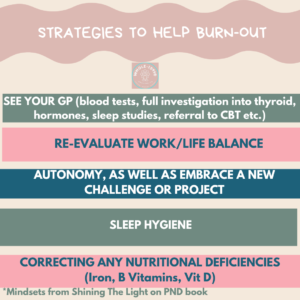
Other points that I feel are relevant include;
Re-evaluate work/life balance; look into what is a source of stress for you, and ascertain your budget and lifestyle and see what/where you can streamline to focus your energy and resources to not feel burnt out:
-
- Meal delivery if food preparation is a source of pain
- Online groceries if going to the shop is a source of pain
- Get a cleaner or housekeeper if that is a source of pain and if your budget allows for it
- Cull extra subscriptions if not value-adding and dedicate that budget into things that will take the stress out of your day-to-day
- Make a roster of tasks around the house; share the work load
- Dedicate different tasks for different days; ‘timetable’ as such to give stability, structure, organisation and clarity vs feeling overwhelmed by all that needs to be done
-
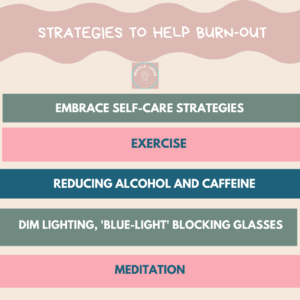
- Trying to gain autonomy can motivate you in your role. Lack of control can make you feel a lack of motivation, so at work or in the home, gaining this autonomy can help
- A challenge may sharpen the saw if you feel like you are bored and cannot keep doing the same thing day in and day out. Variety is a spice of life!
- SLEEP hygiene is a crucial part of HEALTH and WELLBEING; looking into GOOD strategies for sleep
- Exercise is great for all reasons listed in episode 29! Enhanced endorphins and energy, as well as a stress relief outlet. It can also improve sleep which is a pillar of health
- Self-care strategies vs neglect. The cliché of ‘filling your own cup first’ becomes important so that your body, mind and soul feel supported, nourished and rejuvenated
- Correcting any nutritional deficiencies; low iron, B vitamins, vitamin D is a hugely common one these days being inside all the time!
- Reducing alcohol intake; as per last week’s episode and all the impacts that it can have to our biochemistry and sleep. It can exacerbate anxiety and depression, so reducing this can help you thrive and have more endogenous energy
- Reducing the reliance on caffeine; it stimulates the CNS, to give ‘seemingly energy’ stores; but true energy comes from low GI fuel sources. Caffeine simple makes your CNS pump harder and our adrenal system to be in the ‘fight or flight’ mode; which stretches our already stretched nervous system
- Be fluid, flexible and don’t sweat the small stuff!
- Blue light blocking glasses can help to regulate the circadian rhythm and reduce the strain on the nervous system by the bright lights (laptops, phone throughout the day; and try to embrace a ‘WIND-DOWN’ routine at night)

- Dim lighting at night time
- From an Ayurvedic perspective; excess VATA, too much air and space can create this feeling of anxiety, erratic mind and feeling frazzled! Strategies that put back EARTH and FIRE; through all 5 senses will make an impact in feeling grounded and more ‘centred’;
- Sesame oil massage on the body twice a day; at least on your scalp, back of the neck, the wrists and soles of the feet
- Cooking with VATA pacifying spices, choosing VATA pacifying produce, eating warm and cooked meals rather than raw and cold meals
- Meditation to slow the mind
- Exercise that is more heating, not too movement based but a slow hatha yoga that is really focussed on grounding. We want to replenish the nervous system, not push it harder. Yin and restorative yoga is beautiful, swimming or rowing.
- Pranayama, focusing on slow and connected breath; NADI SHODHANA would be mindful and calming to the nervous system
- Reducing refined sugar, less packaged and convenient style foods; but more fresh, PRANA rash foods. The energy or VIRYA behind foods affect the mental quality to be TAMASIC; which is dull, inert and stagnant or RAJASIC; which is the active, monkey mind mental quality. We want to enhance SATWA, or this serene, calm and poised qualities through SATTWIC food and practices
- Journaling anything that pops up for you
- Meditation
- Use of MUDRAS; the thumb and ring finger for example called the ‘SURYA MUDRA’, connects the FIRE and EARTH elements and can be very grounding
- With parenting, call in your tribe. We are not designed to do everything ourselves. Ask for help; and for anyone who has the capacity to help a family member or friend who is sinking; help them. The more we can be there for one another, the less we live in this very individual way; but rather as a community with connection, kindness and compassion.
- Connection with friends, family, your partner! We are human beings not doings! Connect, connect connect!
- Bring more JOY and fun into your lives! Life is short, I know we get so caught up on work. The ‘practical’ aspects of life; but with health, with time on our side, we have the capacity to bring in lightness and flow and ease…you are worthy and deserving of this!
- Remember that self-care is not a luxury or selfish! Make time for what you love to do; it does not have to be the same for everyone! But definitely make time for it
- **There is an excellent article at; https://www.psychologytoday.com/au/basics/burnout

